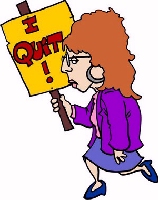 The Caregiver's Dilemma - When to Quit
The Caregiver's Dilemma - When to Quit
An elderly caregiver's dilemma occurs when a caregiver's own health, safety, and sanity is ignored for the sake of caring for an elderly parent, spouse, or other relative. This is not healthy and can be dangerous for both parties involved.
The dynamics between healthcare giver and the recipient of care are only a small part of the picture. An entire family should be involved in it, although usually that is not the case. Most often, the majority (if not all) of these extraordinary duties befall a designated family member, usually a female--even if that female is not a blood relative (such as an in-law).
Internal family strife may worsen a situation that is already fraying the nerves of family members. Dysfunction in any family may be heightened by the stress of deciding who needs to care for the elder and/or the care that is currently being provided. Old issues may be exhumed and rehashed; hurtful comments, like verbal hand grenades, may be lobbed at those who are trying the most to help but receiving little or no recognition.
Worse yet, legal threats may ensue. If you think a relative with whom you have had a rocky relationship will not call Social Services and file a false report against you, think again. The system is set up to side with the elderly person, not you as a caregiver. Reports, however false or inaccurate, will be investigated; and you will never know what has been reported about you (or by whom) unless/until you find yourself on the wrong end of a lawsuit.
If you find yourself in the aforementioned situation, I have great news for you: You can, you must say no to caregiving for your elder(s) and mean it. Your responsibility to your parents (or spouse) is not to sacrifice your heart, mind, body and soul for them. Your responsibility is to ensure that they are safe from harm, receive the proper nutrition, and the best care that can be afforded to them. This work must be delegated to someone else in the family (in a perfect world, it would befall the most vocal critic) or else other arrangements need to be made such as daily home healthcare visits, live-in healthcare, transfer to an assisted-living apartment, or even transfer to a nursing home.
Providing and meeting healthcare needs for someone--let alone a relative--holds many challenges and, as such, is a fluid situation to which one must make
immediate adjustments and snap decisions that must be appropriate. It is best to leave this to the professionals who have been trained to handle all aspects of elder care.
Do not feel any guilt about aborting the mission and reclaiming your life; set boundaries with which you are comfortable and avoid the pitfalls of an elderly caregiver's dilemma.
Mary Ruff-King has experienced the highs and lows, joys and despair of caregiving. She is now happily writing articles on all topics.